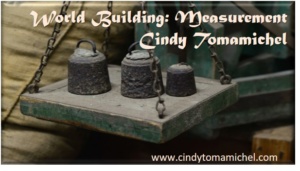People have been making up ways to measure and define all the things for a very long time, perhaps longer than we can measure. So if in “real” life people make up stuff that becomes a standard, what shall we do in a fictional world? Stick to tradition or make up some wacky system ourselves?
 The earliest forms of measurements were used by the Mesopotamians in around the 4000BC mark. So, some 6,000 years ago people were arguing about what weight of grains they bought and sold. Roman weights and measures have been found that have been modified to give false measurements for goods.
The earliest forms of measurements were used by the Mesopotamians in around the 4000BC mark. So, some 6,000 years ago people were arguing about what weight of grains they bought and sold. Roman weights and measures have been found that have been modified to give false measurements for goods.
But what about even earlier? Would a cave dweller need to measure things? The distance it takes to walk to a destination, how big to build a shelter, or the right amount of herbs in a potion. All these require reasonable accuracy, and the nearest thing available was the human body. Hence, measurements in feet, a handspan, a fingers breadth, a pinch. This sort of measurement system is one readily adopted for fantasy writing. A rough estimate of a days ride for a horse may be quite adequate for the reader. Jean Auel in her Earth Children series had a section where she discussed that some people could not read a map scratched on a flat bone, and that distances themselves varied between walking and horse riding. Places became closer when humans moved faster. So even the perception of landscape changed with different forms of transport. Even today, the idea of being in one country for breakfast and another for dinner seems unreal.
So a rough system of measurement based on the human body seems adequate for fantasy. If the author makes up something complicated it can distract from the story unless it is important. There are plenty of archaic and quaint systems to use, including such measures as a cow’s grass, cubits, chains or the imperial system. Here is a list https://en.wikipedia.org/wiki/List_of_unusual_units_of_measurement
For historical authors, research is the only way to figure it out for your time period, unless you avoid it altogether. But it can play an important part – will it the heroine get to the city in time to rescue the dashing aristocrat from the guillotine? In a time travelling DeLorean yes – but a donkey cart, well, she will be settling for a handsome sweaty farm hand instead. I was slightly interested to find out the metric system has been in use since the 1700’s, but not uniformly adopted. So research is key to getting it right, particularly the words used. Apothecary weights anyone?
But venturing into scifi it becomes far more technical. Which should not be confused with interesting, as I suspect there are few readers that interested in detailed calculations of made up units, based on six moons circling a black hole or something. Heinlein managed to squeeze in some equations in a few of his novels, but they were at least based on our solar system. While I never checked, there would be readers that did, and so accuracy is important if you are going to include math and calculations. Asimov and his story “Nightfall” is probably one of the most compelling ideas based on celestial timing. Well worth checking out.
The measurements of space already sound wonderfully futuristic – light years for instance. Depending on your type of scifi, the depth of tech detail will vary. Writers of hard scifi will know their readers expect technical accuracy, whereas softer forms of scifi can get away with a bit of handwavium action. A good rule of thumb – and this goes for all fiction – if you don’t know, either find out, or leave it out.
What is important is to pick a standard and stick to it. Don’t be walking clicks one page and miles the next. This even causes problems in real life, with space and airline disasters arising from a mismatch of units. Walk a while in another person’s shoes – but will they be imperial or metric?
Enjoy this blog? Have a think about signing up via my website or catch them as they fly around the ether on twitter or facebook. They will stay where they are pinned on pinterest.
For those that have not read Druid’s Portal yet, here is a link to the first chapter DruidsPortal
Scifi more your thing? Try my short stories in the anthologies Quantum Soul and Tales from Alternate Earths 2.
Short stories and poetry? Try the Rhetoric Askew anthologies: Mixed genre, Adventure or Romance
Tired from all that thinking? Try a 5 Minute Vacation! 5 Minute Vacation

